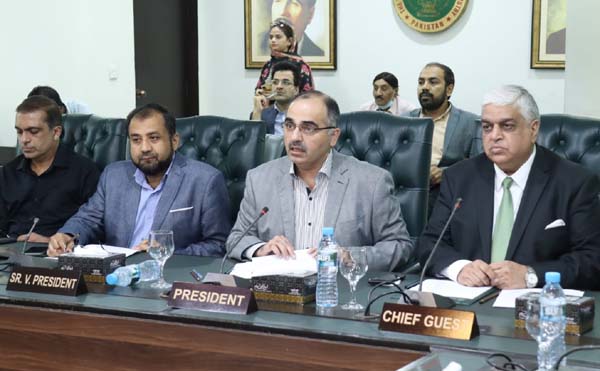#LCCI seminar highlights challenges and #evolution of barter trade #system

Lahore (MNP) The Lahore Chamber of Commerce and Industry (LCCI) organized a seminar shedding light on the intricacies of barter trade, chaired by LCCI President Kashif Anwar. The event saw a large gathering of entrepreneurs eager to understand the mechanisms of barter trade.
Khalid Hussain, CEO Khalid Associates gave a detailed presentation while LCCI EC member Mian Attiq-ur-Rehman and Adeeb Iqbal Sheikh also spoke on the occasion.
LCCI President Kashif Anwar said that recently the government of Pakistan has agreed on barter trade mechanism with Iran, Afghanistan and Russia which is a good sign as the country is facing shortage of foreign exchange. For Pakistan, Iran, Afghanistan and Russia are all three markets with immense commercial potential.
He said that the implementation of this barter trade mechanism will help in substantial increase in trade volume of Pakistan with these countries. He said that this would not only reduce the pressure on the local currency but would also improve the foreign exchange reserves and help to get out of the balance of payment crisis. In addition, the availability of imported raw materials obtained through barter trade would reduce the cost of doing business in the country.
The LCCI President said that Pakistan is currently facing an energy crisis. Under barter trade it is also intended to import oil and energy from Russia. He said that the facilitation of barter trade will help in reducing the prices of petroleum and energy which will stabilize the economy as a whole. Right now, from the common man to every sector of the country’s economy, the biggest problem is rising energy tariffs, which must be controlled.
He said that the sectors in which we can export under this agreement include milk, eggs, grains, meat, fish, fruits and vegetables, rice, salt, pharmaceutical products, leather and leather apparel, ready-made garments, textiles, shoes, electrical items, copper, aluminum, furniture, surgical instruments, steel and sports equipment. He said that Pakistan will be able to import fruits, dry fruits, spices, oil seeds, minerals, metals, raw rubber, cotton, coal etc. from Afghanistan, while from Iran they would be able to import chemical products, fertilizers, petroleum, kerosene, LPG, LNG and raw wool. Under this agreement, Pakistan would be able to import chemical products, fertilizers, petroleum, kerosene, LPG, LNG, pulses, wheat, articles of wood and paper, iron and steel including textile industrial machinery from Russia through barter trade. He said that the criteria for benefiting from the barter trade is to be included in the active tax peer list.
Khalid Hussain delved into the concept of barter trade and its historical significance. Before the advent of currency, barter involved the direct exchange of goods and services between parties, creating a moneyless economy. For a barter transaction to occur there must be a double coincidence of wants – a challenging condition where both parties must desire what the other has to offer.
Khalid emphasized that barter trade is often observed between countries facing US sanctions, as well as those under UN sanctions, which currently encompasses over 30 nations. Such sanctions lead to trade restrictions, prompting nations to explore alternative means of conducting international commerce.
